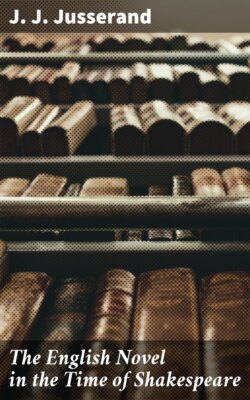Читать книгу The English Novel in the Time of Shakespeare - J. J. Jusserand - Страница 13
На сайте Литреса книга снята с продажи.
III.
ОглавлениеTable of Contents
Some years before Sir Thomas More wrote his "Utopia," an Englishman, who had long lived abroad and had there learnt a new industry, unknown in his own land, returned to England and settled in Westminster. He and his trade were destined to exercise a very important influence on the diffusion of literature, and especially on the development of romances. His art was printing, and his name was Caxton. We can judge of the amazement he produced among his countrymen by his new art, from his own wonder; one of his prefaces shows clearly enough how extraordinary his performance seemed to himself: "And for as moche, says he, as in the wrytyng of the same my penne is worn, myn hande wery & not stedfast, myn eyen dimed with overmoche lokyng on the whit paper & my corage not so prone & redy to laboure as hit hath ben & that age crepeth on me dayly & febleth all the bodye, & also be cause I have promysid to diverse gentilmen & to my frendes to addresse to hem as hastely as I myght this sayd book, therfore I have practysed & lerned at my grete charge & dispense to ordeyne this said book in prynte after the maner & forme as ye may here see, & is not wreton with penne & ynke as other bokes ben, to thende that every man may have them attones, ffor all the bookes of this storye named the recule of the historyes of troyes thus enpryntid as ye here see were begonne in oon day & also fynysshid in oon day."[21]
The list of his books shows that he was no less intent upon diverting his customers than upon improving their knowledge and morals. The part allotted to fiction was extremely large, not perhaps quite so extensive as that occupied by the novel proper in the publishers' lists of to-day; but regarding it as merely a beginning, it must be admitted to be very promising. Not only did he print the tales of Chaucer, the confessions of Gower, with their numerous stories, several poems of Lydgate, a number of mediæval epic romances in verse, but he also issued from his press the prose story of "Reynard the Fox," which contains so much excellent dialogue and so many fine scenes of comedy; and, besides, the most remarkable prose romance that had yet been written in the English language, the famous "Morte d'Arthur" of Sir Thomas Malory. Its appearance marks an epoch in the history of English romance literature.
Why, among so many famous works, should this publication have obtained the preference and the attention of the printer? Caxton states his reasons very clearly: firstly, for him as for Layamon, Arthur is a national hero, and Englishmen should be proud of him: then again he is one of the nine worthies of the world. These nine dignitaries were, as is well known, three pagans, Hector, Alexander and Cæsar; three Jews, Joshua, David and Judas Maccabæus; three Christians, Arthur, Charlemagne and Godfrey of Bouillon. And lastly, Caxton considered his undertaking justified by the great lessons that were to be drawn from Arthur's example: "And I accordyng to my copye have doon sette it in enprynte to the entente that noble men may see & lerne the noble actes chyvalrye the jentyl & vertuous dedes that somme knyghtes used in tho dayes by whyche they came to honour & how they that were vycious were punysshed & ofte put to shame & rebuke, humbly byseching al noble lordes & ladyes wyth al other estates of what estate or degree they been of, that shal see & rede in this sayd book & werke, that they take the good & honest actes in their remembraunce & to folowe the same. Wherein they shalle fynde many joyous & playsaunt hystoryes & noble & renomed actes of humanyte gentylnesse & chyualryes. For herein may be seen noble chyvalrye, curtosye, humanyte, frendlynesse, hardynesse, love, frendshyp, cowardyse, murdre, hate, vertue & synne. Doo after the good & leve the evyl & it shal brynge you to good fame & renommee."[22]
Everything, in fact, is to be found in Malory's book; everything, except those marks of character which transform traditional types into living personalities; everything except those analyses of feeling which are for us the primary raison d'être of the modern novel and its chief attraction. The old knight's book is a vast compilation in which he has melted down and mixed together a large number of tales about Arthur, Lancelot, Gawain, Galahad, Percival, and all the Knights of the Round Table. An infinite number of short chapters, written in a clear and quiet style, possessing no other charm than its simplicity, tell of the loves and of the fights of these famous men; "of theyr marvaylous enquestes and adventures," as Caxton has it, "thachyevyng of the Sangraal, and in thende the dolorous deth and departyng out of thys world of them al." Malory never made the slightest effort to reach a grand style; he did not think that there could be any other method of writing than that of putting on paper, without preparation, what first came into his mind. Since he possessed neither a passionate temperament nor a wandering imagination, he tells, without any apparent emotion, the most important of his stories, even the last battle of his hero[23] and his final disappearance, when he is borne by fairies into the Vale of Avilion. It is for sensitive hearts to weep over these misfortunes, if they choose. As for him, he goes on his way, telling tale after tale, in the same clear and even voice; but very rarely giving us his confidence or opening to us his heart.
